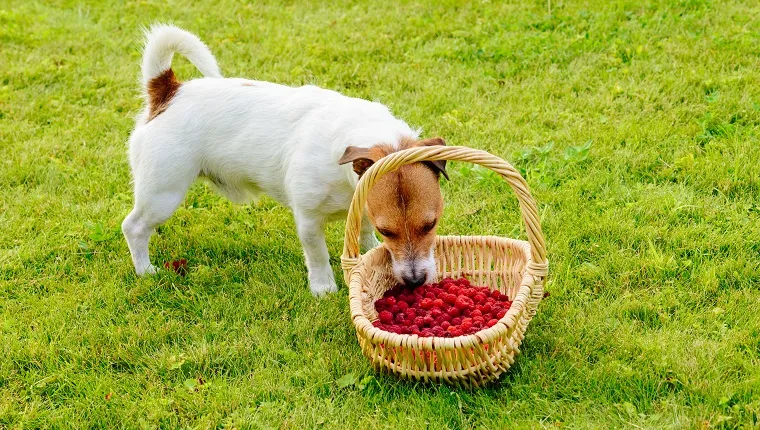Can dogs eat raspberries? For humans, raspberries are a well-known and much-beloved snacking fruit. Popping a few in your mouth for a mid-day energy boost is easy and tasty. But are raspberries a safe snack to share with our dogs?
The short answer is yes, raspberries are an easy and safe snack for our dogs with one minimal health concern. They contain natural xylitol, a sweetener that is toxic to dogs in high amounts. Therefore, moderation is key when serving these berries to your pooch.
Fruits that are easy to prep — and also toss — for our dogs are hugely convenient, especially when they’re highly nutritious. Blackberries, for instance, are another wonderful option.
Just remember to ask your veterinarian before adding any new foods to your dog’s diet. Here is what you should know about why raspberries are a wonderful, light, and easy snack for our dogs.
How Are Raspberries Good For Dogs?
Raspberries are attractive, tasty, little berries, loved by humans and animals alike. They’re especially wonderful for dogs because they’re fun to catch mid-air.
Of course, that’s not the only reason they’re good for dogs. Raspberries contain a significant amount of vitamin, mineral, and antioxidant content, all while being low in sugar and calories.
Packed into that tiny berry is a wealth of dietary fiber, powerful antioxidants, vitamins C, K, B, potassium, manganese, magnesium, copper, folic acid, and iron.
As far as berries go, they’re one of the most nutritious and help to fight off heart disease, cancer, diabetes, and arthritis.
Plus, dogs typically love the flavor. They’re more sweet than sour with a delightful smell that dogs tend to find very appealing. What’s not to love about this little miracle berry?
How Can I Safely Give Raspberries To My Dog?

When it comes to raspberries, there are two big things to be aware of.
First off, raspberries should always be thoroughly washed before you or your dog consume them. Harmful pesticides sometimes still linger on the outside of fruits we typically eat whole. A quick rinse is usually all they need to be safe.
Second, raspberries contain one of the highest levels of natural xylitol, a sweetener found in fruits and vegetables. For humans, xylitol isn’t an issue. This sweetener is used in many of our products as a replacement for sugar. But for some dogs, it can be problematic and even toxic.
In most cases, xylitol is only an issue in either large quantities or far too frequent feedings. If you give your pup a few raspberries as an occasional and special treat, this likely won’t be anything to worry about.
However, before fully introducing raspberries as a semi-regular treat, you should give it a little test run. Give your dog a few berries, then keep an eye on them for a few hours to see if they have any diarrhea, vomiting, or constipation.
Likely, your veterinarian is well-versed in the effects of xylitol, so if you have any further questions or concerns, definitely get all the answers you need in advance.
Do you ever offer raspberries to your dog? Have you ever used them as a treat? Let us know in the comments below.









